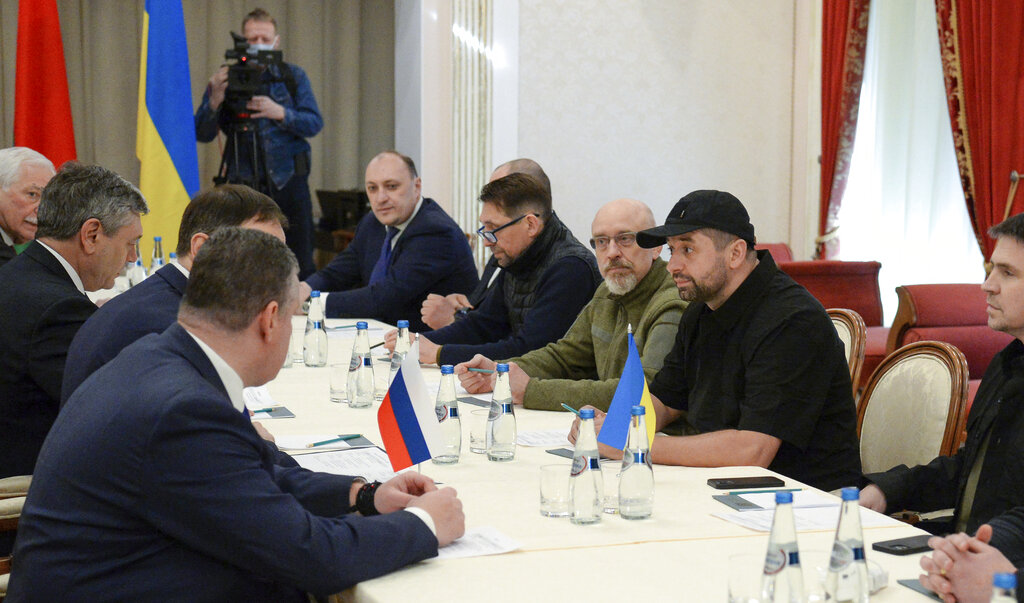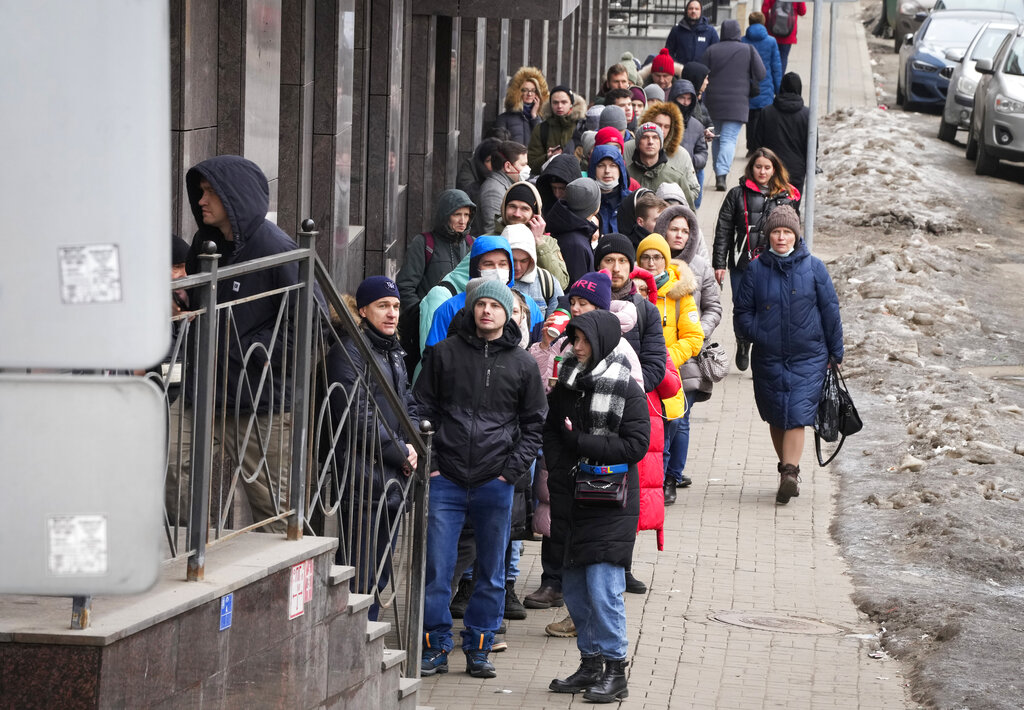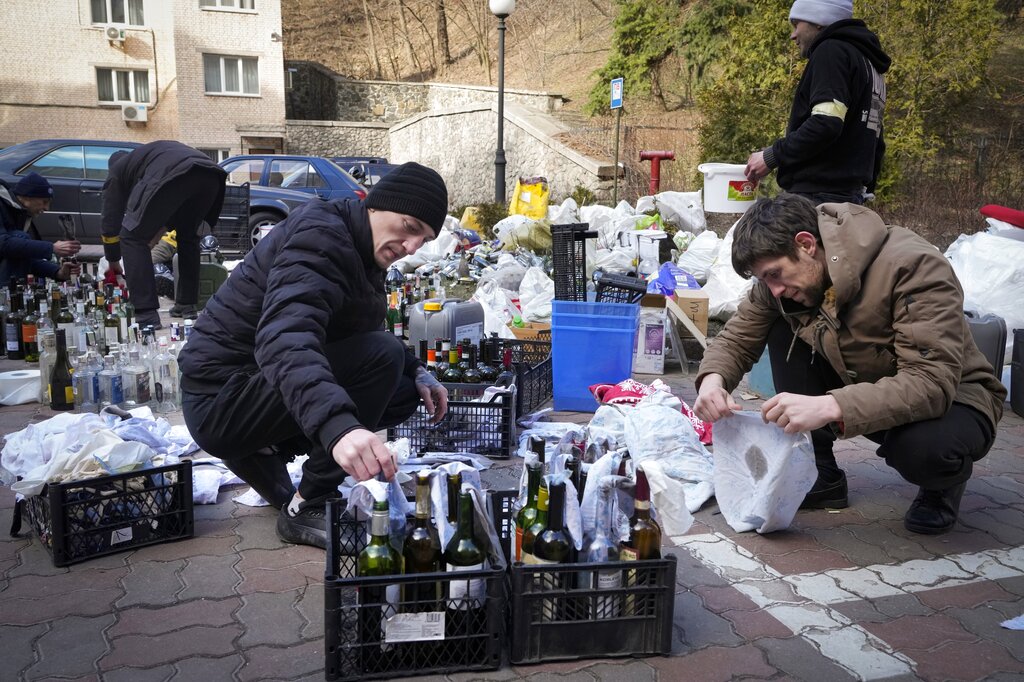Delegations from Russia and Ukraine met Monday near the Belarusian border for their first direct talks, five days after Moscow began an intense, all-out assault on its Eastern European neighbor.
Ukrainian President Volodymyr Zelensky, who has decided to stay and fight in Ukraine, remained skeptical that the talks would bring an end to the fighting that has killed more than 350 civilians. However, his office said Ukraine would push for “an immediate cease-fire and the withdrawal of troops.” Belarusian Foreign Minister Vladimir Makei, who greeted the delegations, expressed hope for an end to fighting even as his president, Alexander Lukashenko, was poised to send in troops to help Putin.
“President Lukashenko sincerely hopes that, during today’s talks, it will be possible to find solutions to all the questions of this crisis,” Makei said. “All Belarusians are praying for this.”
The meeting took place as Russia tried to stop its financial hemorrhaging after an onslaught of Western sanctions kicked in.
The country’s Central Bank hiked a key interest rate more than double to slow the ruble’s plunge, but it appeared to be too little too late. As the ruble cratered, the stock market froze, and Russians rushed to withdraw cash. Within a few hours, the ruble lost as much as a quarter of its value. The central bank banned foreigners from selling Russian securities and forced exporters to convert almost all of their foreign-currency revenues into rubles. Then Russia’s stock market closed, citing a “developing situation.”

UKRAINE CLAIMS ROUGHLY 4,500 ENEMIES KILLED AHEAD OF ‘CRUCIAL’ PERIOD IN RUSSIAN INVASION
As Russia was dealing with a financial nightmare on its soil, Zelensky called on the European Union to grant Ukraine immediate membership, saying the goal “is to be together with all Europeans and, most importantly, to be on an equal footing.”
The U.S. Department of Treasury announced Monday that Americans were banned from trading with Russia’s central bank.
“The unprecedented action we are taking today will significantly limit Russia’s ability to use assets to finance its destabilizing activities, and target the funds [Russian President Vladimir] Putin and his inner circle depend on to enable his invasion of Ukraine,” Treasury Secretary Janet Yellen said in a statement.
The British government also took a swing at Russia Monday, banning its country’s financial institutions from conducting business with the Russian central bank as well as with its foreign ministry and sovereign wealth fund.
Prime Minister Boris Johnson called the new sanctions necessary to financially alienate Russia and prevent them from using loopholes to continue to access reserves.
“Putin must fail,” Johnson tweeted.

PUTIN VS THE WEST: WORLD RALLIES BEHIND UKRAINE’S DAVID AGAINST RUSSIA’S GOLIATH
In Ukraine, a three-mile-long convoy of Russian military vehicles pressed down on the capital city of Kyiv as citizen fighters, armed with makeshift weapons and Molotov cocktails, tried to fend off Russian advances. Reports surfaced over the past 24 hours that volunteer fighters from other countries had traveled to Ukraine to help fight Russian forces.
In Kharkiv, Ukraine’s second-largest city, dozens were killed and hundreds were wounded after Russian rocket strikes, Ukrainian interior ministry adviser Anton Herashchenko said in a Facebook post. And though Kharkiv remained under Ukrainian control Monday morning, it was clear the Russian forces had badly battered the city.
Despite this, new British and U.S. intelligence reports seemed to corroborate comments from Ukraine’s military that Vladimir Putin’s foot soldiers had “slowed down” its offensive following logistical failures and fierce Ukrainian resistance.
Nikolay Mitrokhin, a Russia expert and researcher at Germany’s Bremen University, told Al Jazeera that Russia’s offensive has “practically stopped on all fronts.”
“A large morning assault on [the eastern city of] Kharkiv has been repelled and an attempt to enter Kyiv from the [town of] Irpen [to the west] has been stopped,” Mitrokhin said. “Russia’s strategic position … is deteriorating rapidly. The Russian military is suffering great losses.”
However, Mitrokhin said Moscow’s military could regroup and refocus their efforts, taking Kyiv from the north, hitting the southern port city of Odessa, and targeting the eastern city of Poltava.
Despite its advances across the country, Moscow has so far failed to win full control of Ukraine’s airspace.

On Sunday, the EU made the unprecedented move to greenlight the purchase and delivery of lethal weapons to aid Ukrainian resistance.
Putin, citing “aggressive statements” by NATO, ordered Russian nuclear forces to be on high alert, raising fears that the invasion of Ukraine could lead to nuclear war.
As the bloody battles continued, more than 500,000 people have fled Ukraine since the start of Russia’s invasion, Filippo Grandi, the U.N.’s high commissioner for refugees, said.
CLICK HERE FOR MORE FROM THE WASHINGTON EXAMINER
The latest and still growing count had 281,000 people entering Poland, more than 84,500 pouring into Hungary, about 36,400 going into Moldova, more than 32,500 in Romania, and about 30,000 entering Slovakia, U.N. refugee agency [UNHCR] spokeswoman Shabia Mantoo said.

